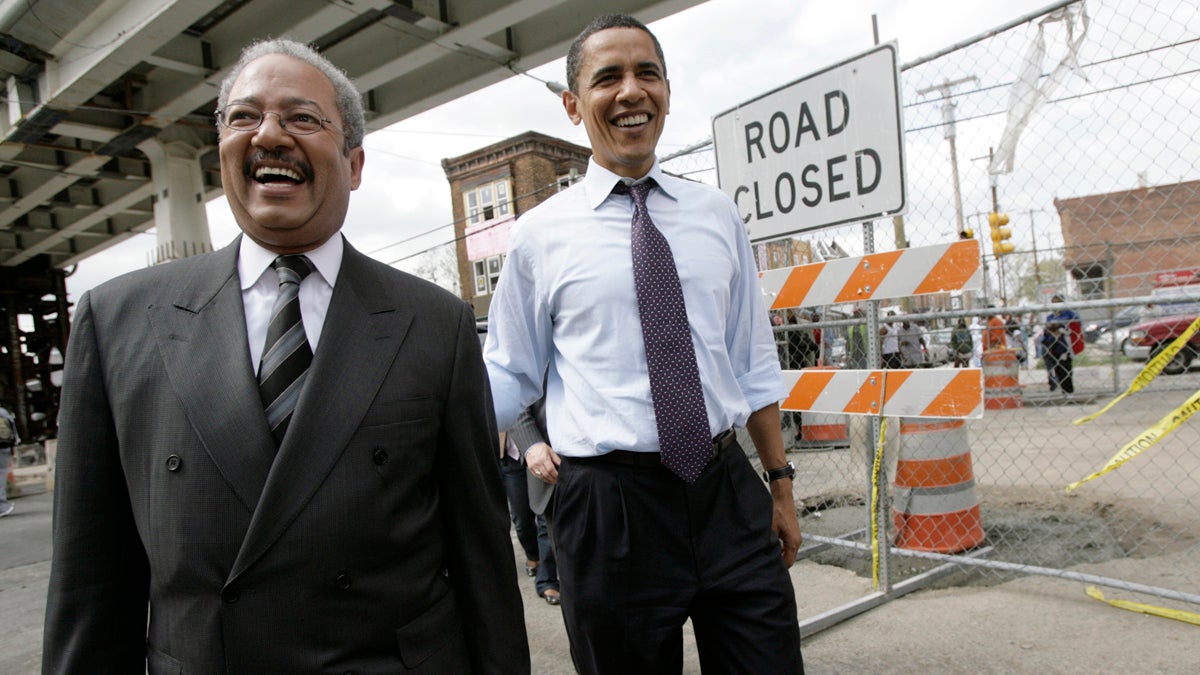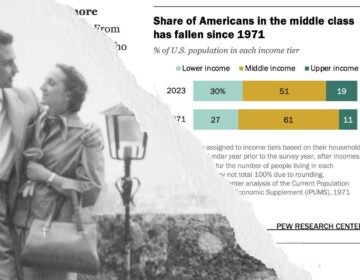On eve of Pacific Rim trade vote, area legislators wary of another NAFTA

U.S. Rep. Chaka Fattah campaigns with Barack Obama in 2008 in Philadelphia. Fattah has serious reservations about Obama's Pacific Rim trade deal. (AP file photo)
It’s hard, if not impossible, to tell the true impact of trade agreements. Take NAFTA — the North American Free Trade Agreement passed in the ’90s under President Clinton.
Since then, millions of jobs have evaporated, while millions of others have sprung up in, for example, the technology sector.
With that as prologue, President Obama is having a hard time convincing Democrats from the Delaware Valley region to support his trade deal with Pacific nations. He’s also having trouble convincing skeptical Republican to get on board.
As the House prepares to vote on the deal Friday, U.S. Rep Chaka Fattah of Philadelphia and many other Democrats say NAFTA is a low point they don’t want to repeat.
“A lot of these trade arrangements have worked against the interest of American workers,” he said. “Particularly in a city like mine, we’ve been devastated by the loss of some of these jobs.”
Now, as federal policymakers are negotiating trade agreements with nations on the Pacific Rim, NAFTA and CAFTA, which covers Central America, have become the talk of the town in Washington. But U.S. Rep. Bill Pascrell, a North Jersey Democrat, says policymakers haven’t learned from past mistakes.
“I mean, we’re stepping back,” he said. “We actually have a worse deal here then NAFTA or CAFTA, as far as I’m concerned.”
Pascrell says it’s so bad in part because it doesn’t include strong enforcement to keep nations such as Japan from manipulating their currencies.
“The administration made it very clear to us from the very beginning, ‘We’re not doing anything about this, because it might spoil things.’ Well, I’m here to spoil things,” he said.
With the majority of Democrats in Congress bucking a Democratic president, the White House has had to go fishing for votes from the GOP. U.S. Rep. Frank LoBiondo, a South Jersey Republican, says the president won’t find much support in his state because NAFTA hurt, and he thinks this deal is more of the same.
“I don’t think it’s a good deal,” he said. “I think it’s going to cost American manufacturing jobs and the country, we can’t afford that, and we can’t afford it in my district.”
But the president has an ally in U.S. Rep. Pat Meehan, a Delaware County Republican, who said past trade deals have left winners and losers at home.
“It’s a mixed bag. I’ve certainly have traditional industries that are tied to it, but we’re also tied to the energy sector which is new,” he said. “Trade and services is a big part of what will be able to be; so anything from insurance to banking to other kinds of opportunities.”
But Meehan said the trade deal could enhance America’s economic security across the globe.
“I’m also particularly worried about the growing influence of China and what the failure for us to collaborate with our allies on trade will mean to their influence not just in Asia but around the world,” he said. “So I think this is an important opportunity for us to make a statement about American leadership while growing our economy.”
Bucks County Republican Mike Fitzpatrick remains on the fence, so he’s thumbing through data on past trade agreements. He said he’s also got an ear to the ground back at home.
“Constituent contact back and forth from my office is starting to pick up in my office,” Fitzpatrick said, describing it as a “mixed bag.”
“I think the foremost responsibility of a legislator is to be a good listener and listen to constitutes to understand the arguments on either side and make a decision you believe is in the best interest,” he said.
Fitzpatrick is far from the only one in Washington waiting until the last minute to decide. Delaware’s lone Congressman John Carney, a Democrat, said it’s “a very cloudy situation.”
While the bill could help Delaware farmers, Carney said he’s been hearing from labor groups and debating with them over the merits of opening up new markets for U.S. goods.
“The question is — and they’ll tell you that they support trade that’s fair, and that’s really the question — what exactly is fair?” Carney said. “We need to do better; we need to find trade policies that are fair and advance the interests of American workers, as well as American multinational companies.”
WHYY is your source for fact-based, in-depth journalism and information. As a nonprofit organization, we rely on financial support from readers like you. Please give today.




